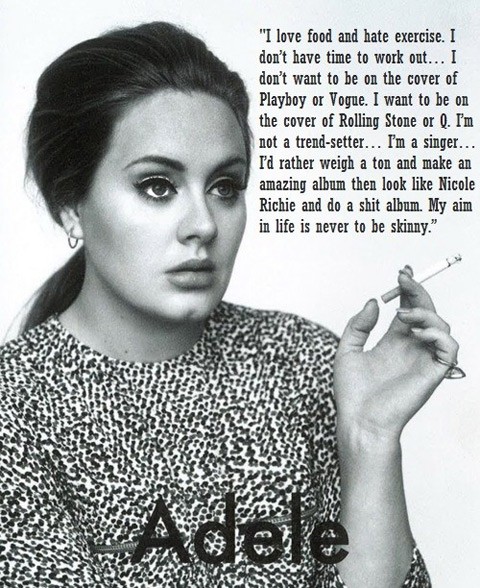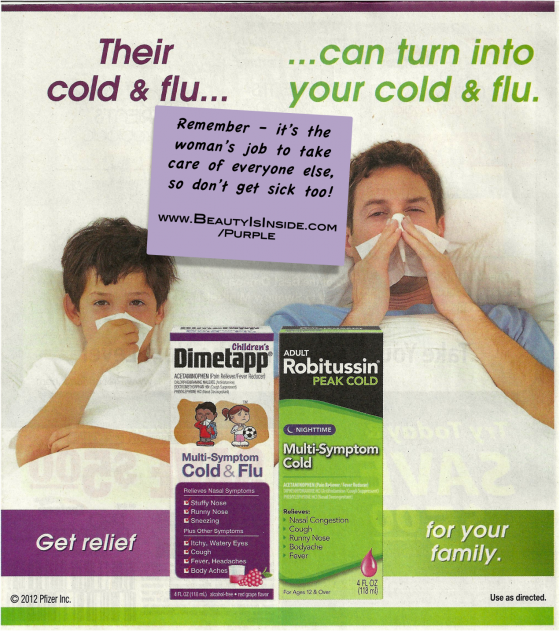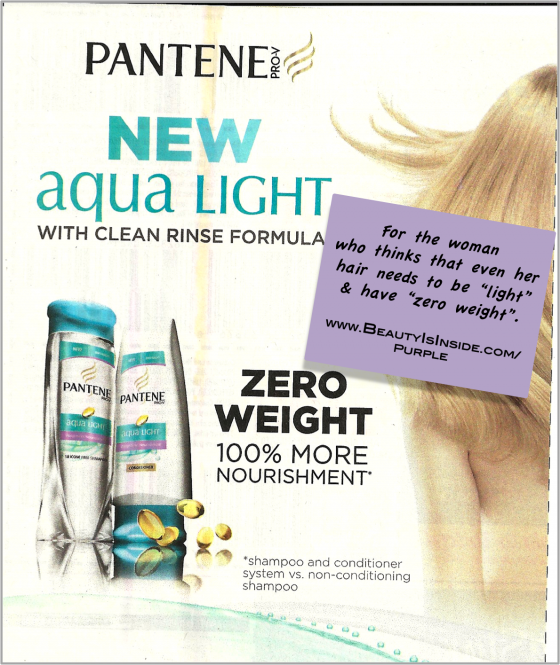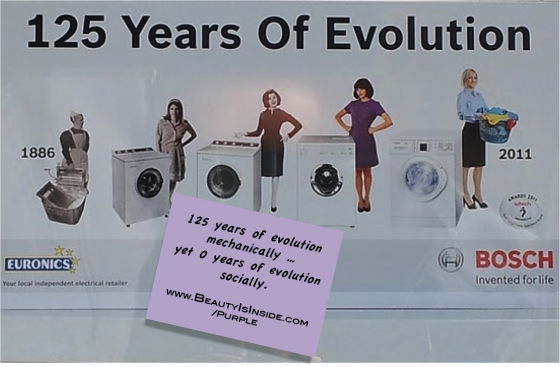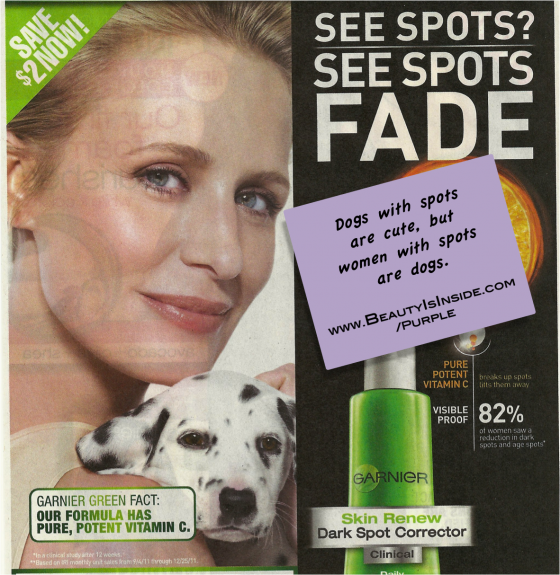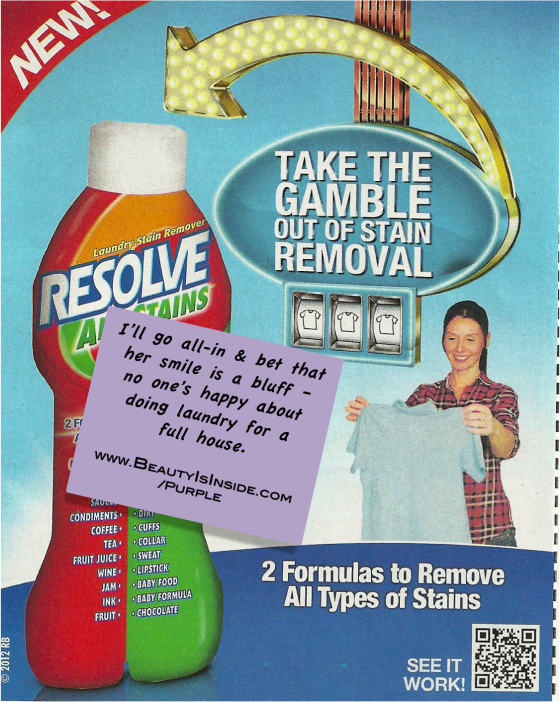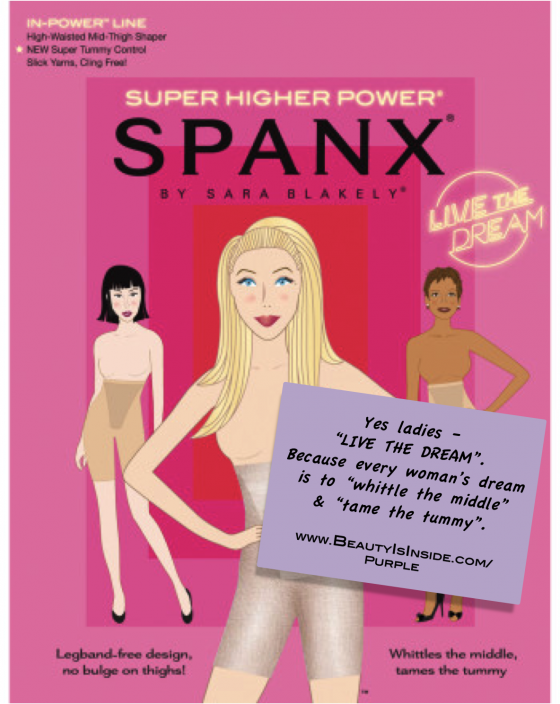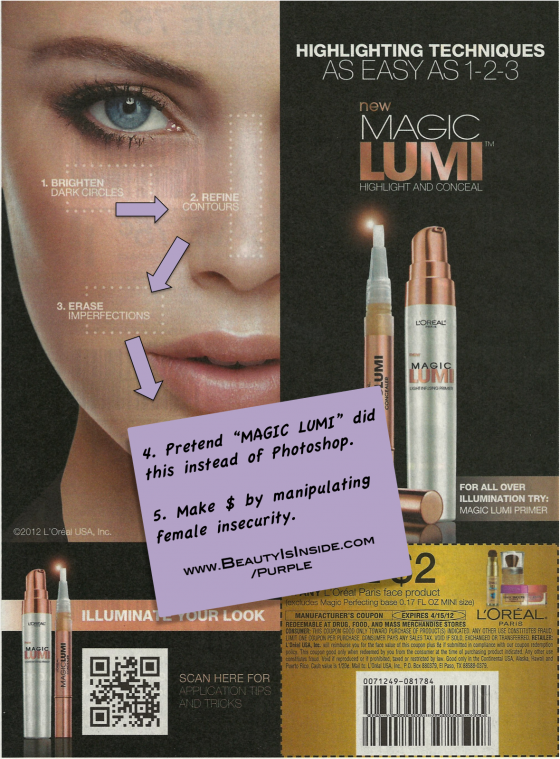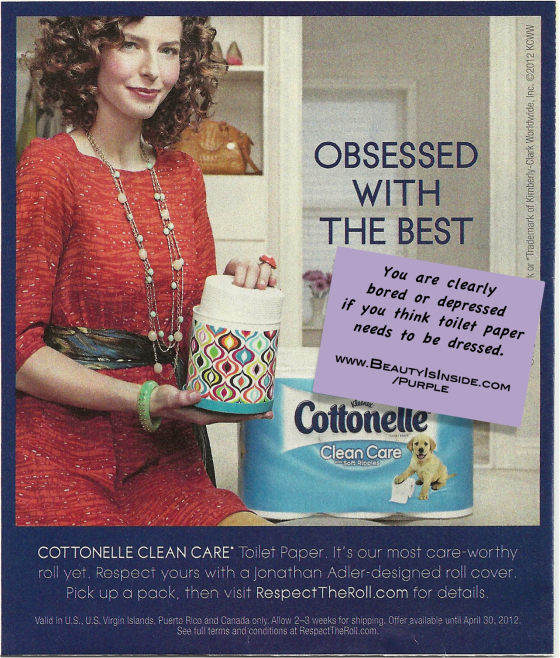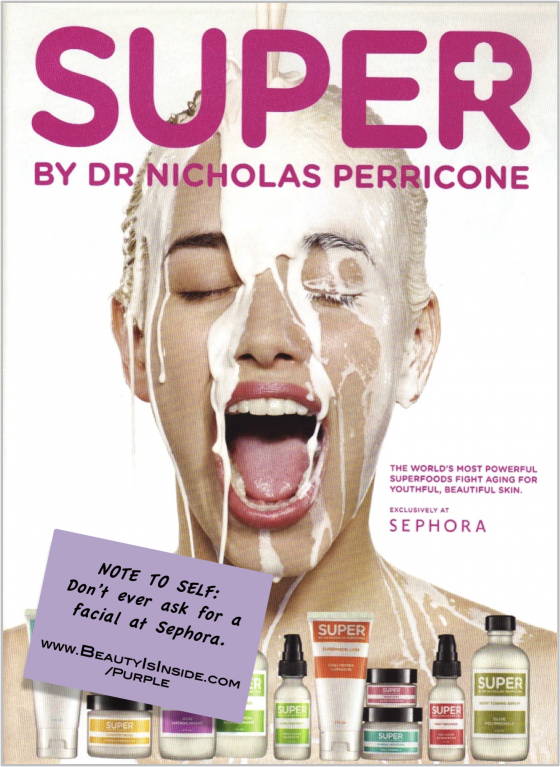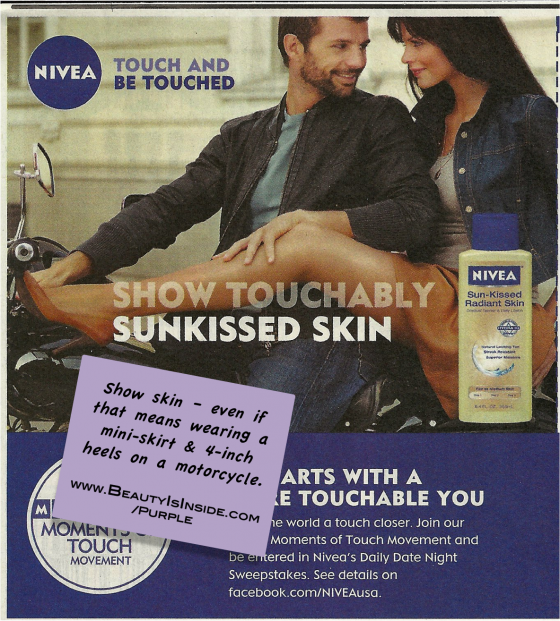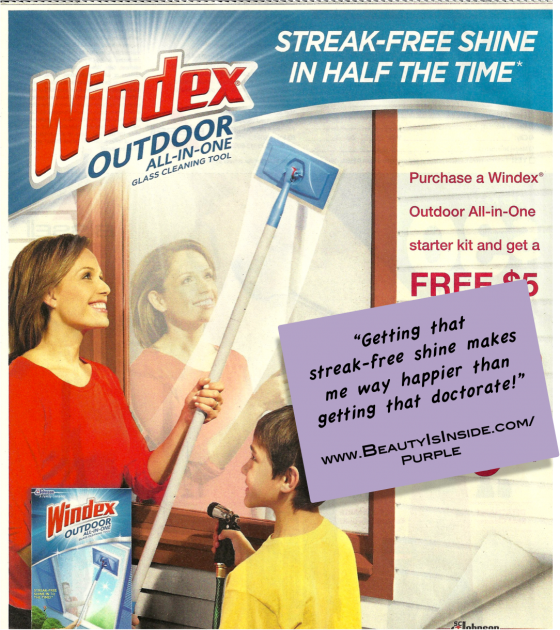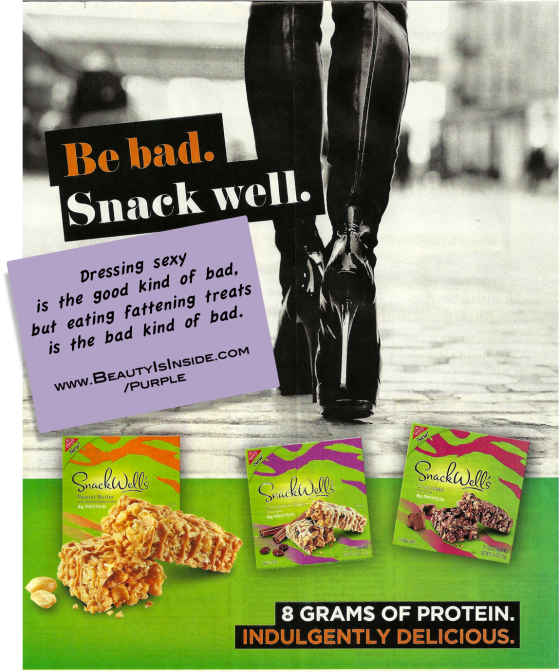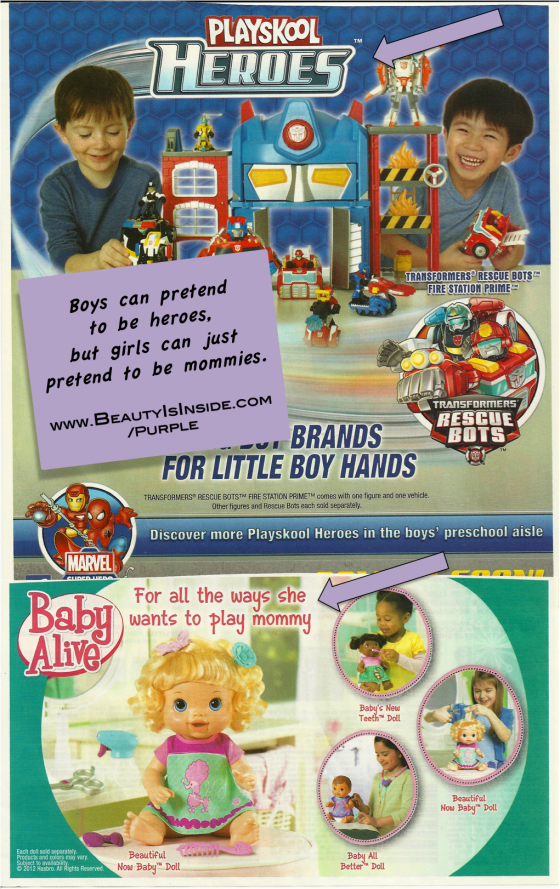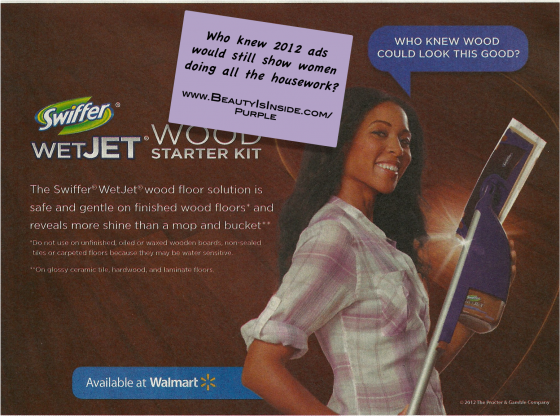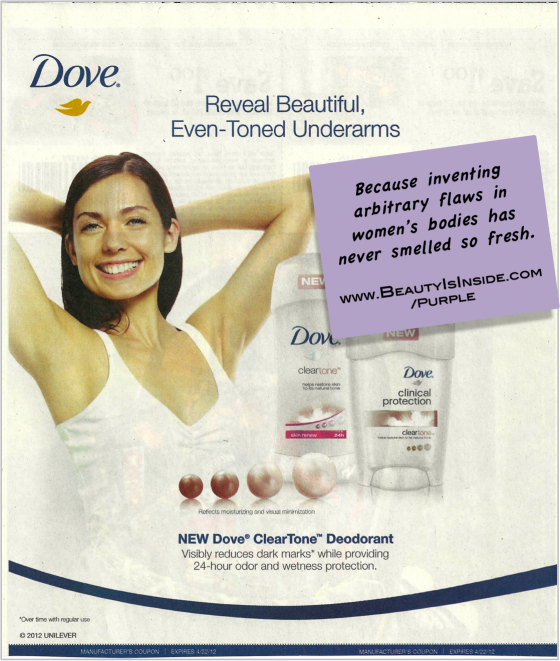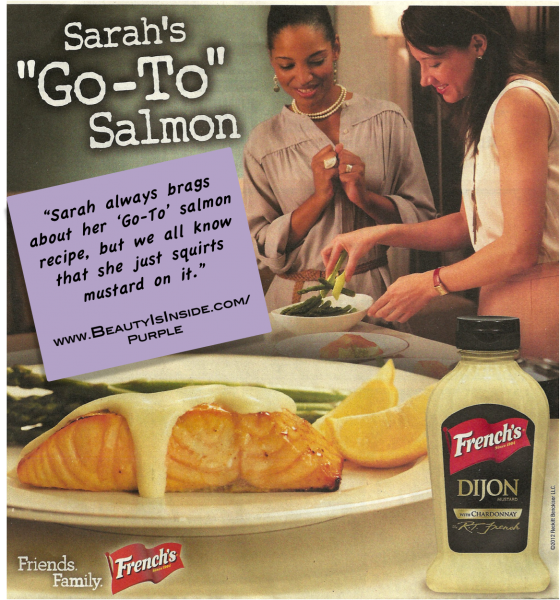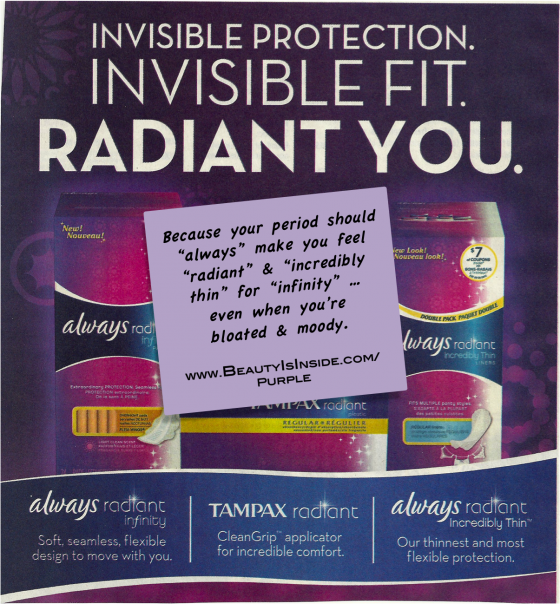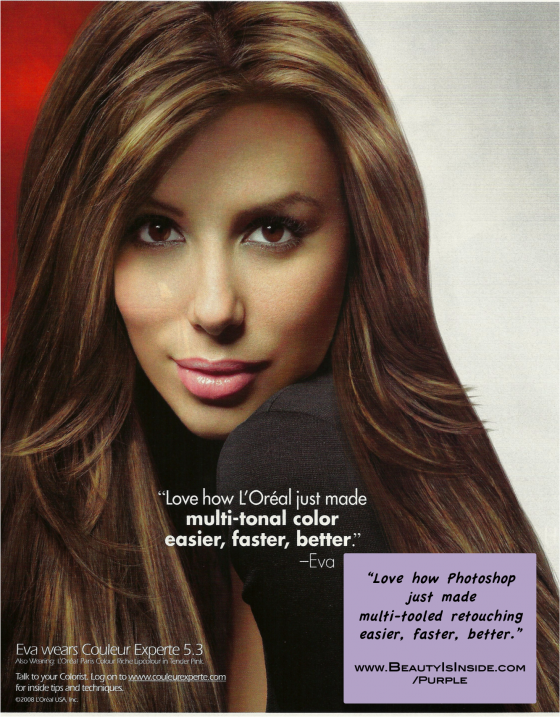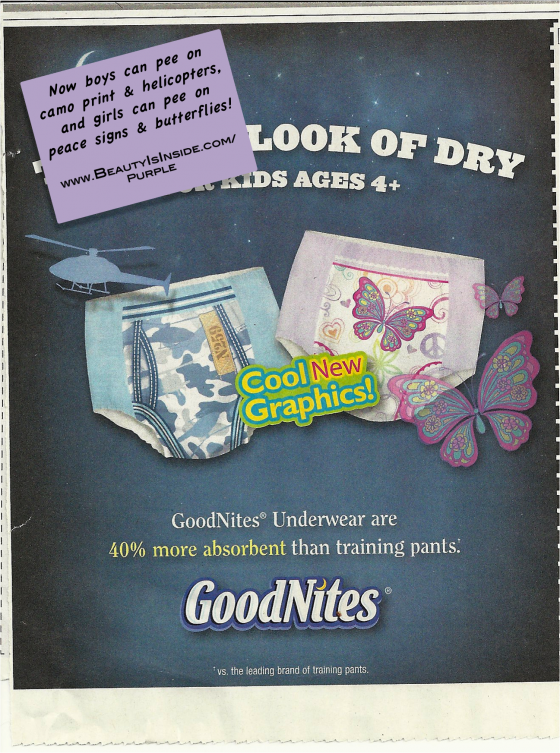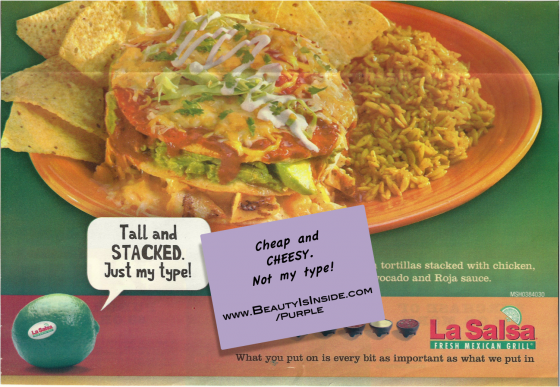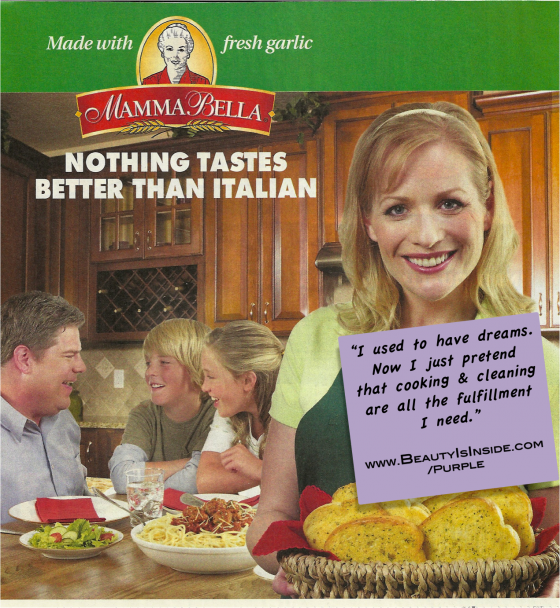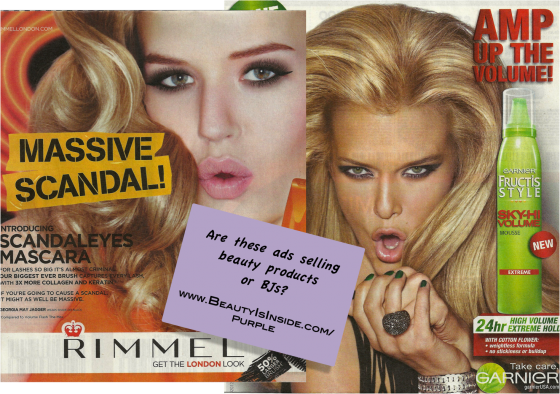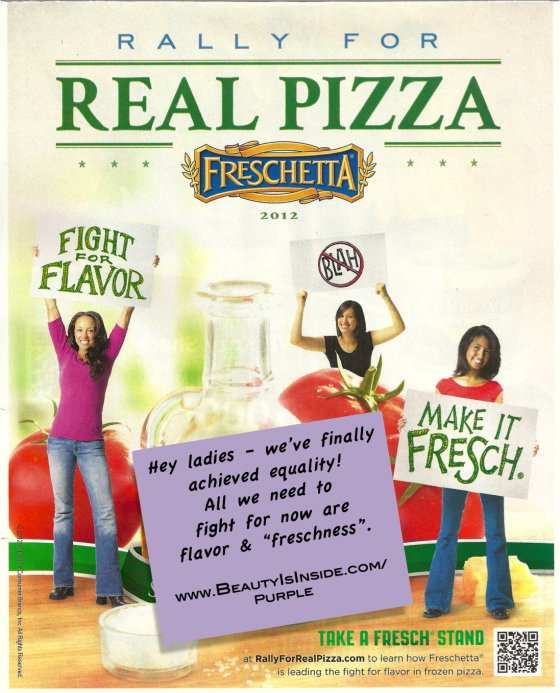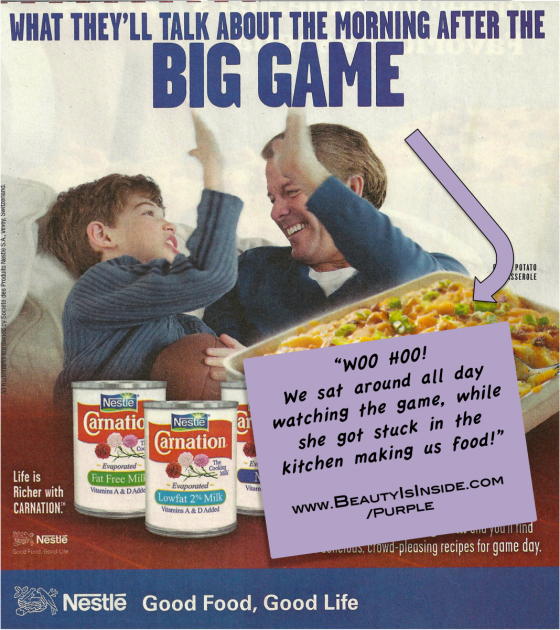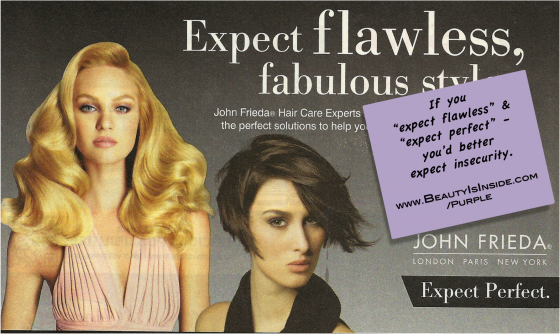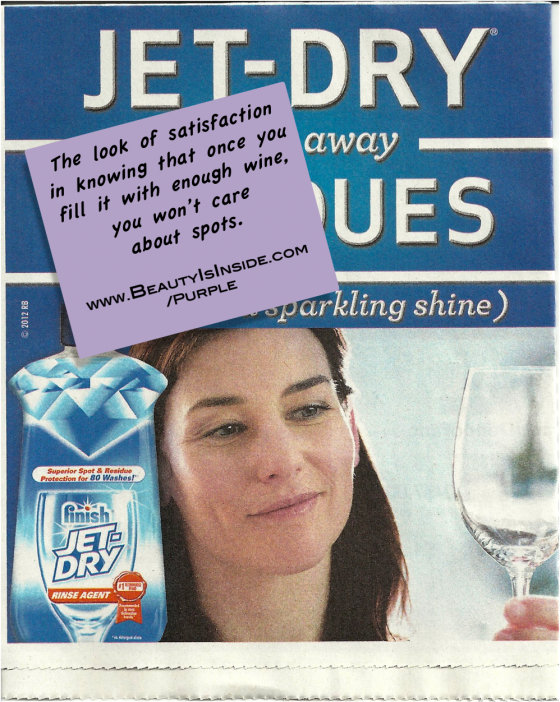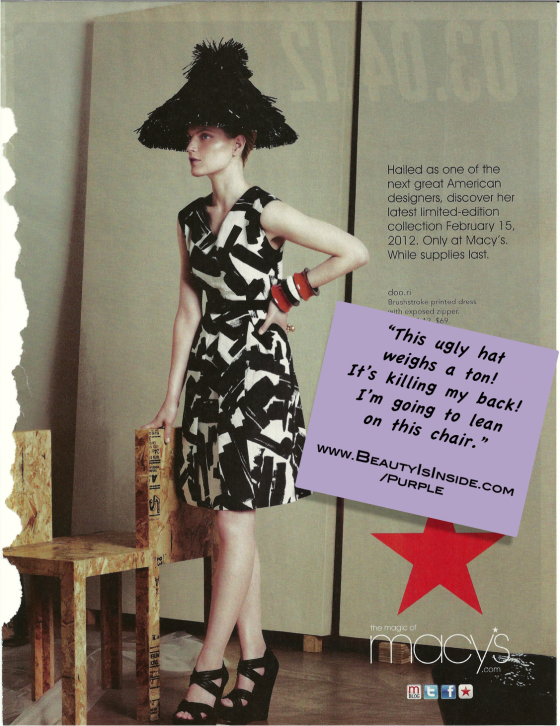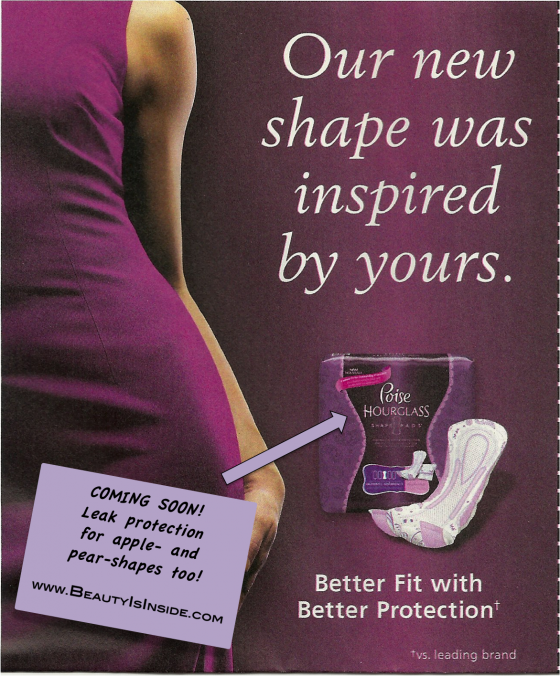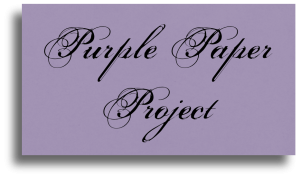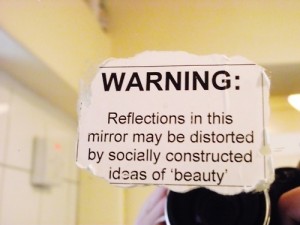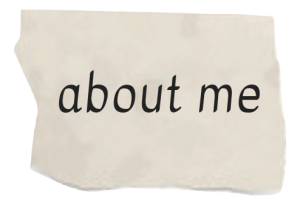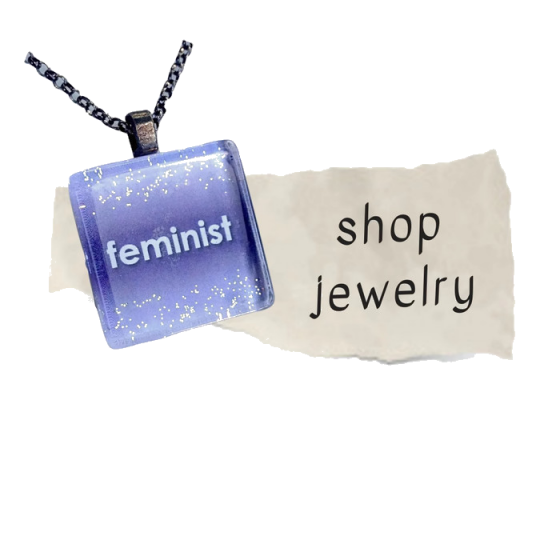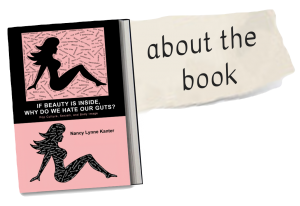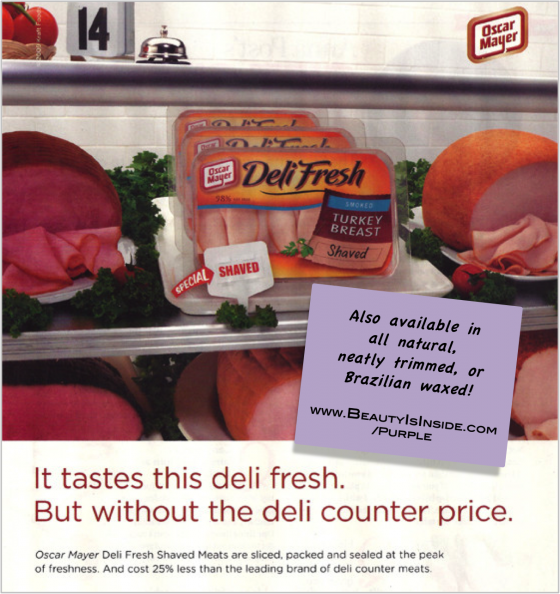
Purple Paper Project – Chocolate
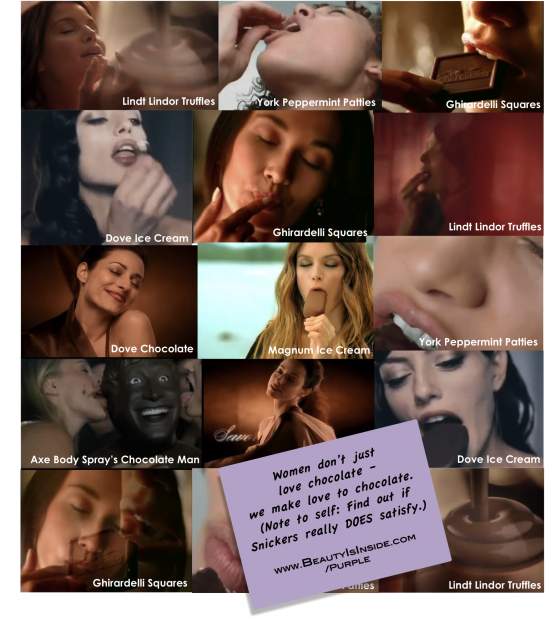
See more Purple Paper Project ads
Still not satisfied? Read this related post: "Epi-Curious? 10 Foods that Women Want to Have Sex With"
Epi-Curious? 10 Foods Women Want to Have Sex With
I recently launched the Purple Paper Project, an "ad campaign" that critiques the way advertisers market to women. In a separate post about advertising, I wrote that "In our image-and-diet-obsessed culture, indulgences like chocolate are forbidden. ... What do you think happens when we’re culturally pressured to be chocolate virgins? We turn into chocolate whores, of course." While all of the following ads show women pleasuring themselves with food, those marketed to women imply that it's a personal and private indulgence. However, the ads created from the perspective of a male viewer depict women seductively eating in a way that vicariously pleasures men. See if you can tell them apart (there is some overlap). Here are the top 10 hottest foods for women:
1. York Peppermint Patty
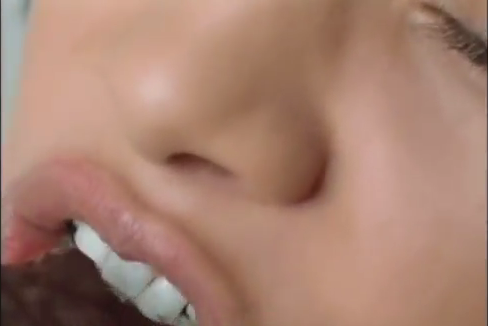 Woman passionately rips the wrapper off the so-cool-it's-hot peppermint patty. She takes a whiff and her eyes roll back into her head (in a good way). She bites the patty and clutches the wrapper like a bedsheet as her eyes dilate and she gives her O-face. Narrator: "York Peppermint Patty. Get the Sensation." Yeah, I think she just did.
Woman passionately rips the wrapper off the so-cool-it's-hot peppermint patty. She takes a whiff and her eyes roll back into her head (in a good way). She bites the patty and clutches the wrapper like a bedsheet as her eyes dilate and she gives her O-face. Narrator: "York Peppermint Patty. Get the Sensation." Yeah, I think she just did.
2. Ghirardelli Squares Chocolate
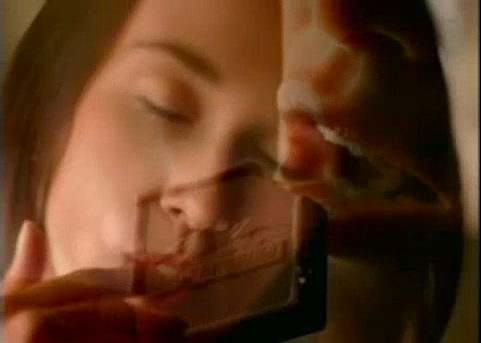 This chocolate has the "ingredients for the most intense chocolate experience" (read: best orgasm). Narrator: "Take time to enjoy your Ghirardelli squares chocolate slowly ... very slowly." Tagline: Ghirardelli. Moments of timeless pleasure." Ladies, this is a chocolate to make love to, not just fuck like a cheap peppermint patty. Because this chocolate's all classy and shit.
This chocolate has the "ingredients for the most intense chocolate experience" (read: best orgasm). Narrator: "Take time to enjoy your Ghirardelli squares chocolate slowly ... very slowly." Tagline: Ghirardelli. Moments of timeless pleasure." Ladies, this is a chocolate to make love to, not just fuck like a cheap peppermint patty. Because this chocolate's all classy and shit.
3. Dove Chocolate
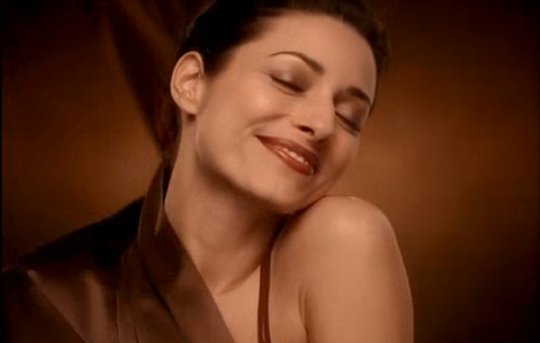 (Cue bow-chika-wow-wow music) Woman takes a bite. This seems to trigger all-over-body groping from a flowing ribbon of silky chocolate ... yes, even right between her legs. Wow, some chocolates have balls. Narrator: "Only a chocolate this pure can be this silky and make you savor, sigh, melt." Tagline: "My moment. My Dove." You can be damn sure she just had a moment with her Dove.
(Cue bow-chika-wow-wow music) Woman takes a bite. This seems to trigger all-over-body groping from a flowing ribbon of silky chocolate ... yes, even right between her legs. Wow, some chocolates have balls. Narrator: "Only a chocolate this pure can be this silky and make you savor, sigh, melt." Tagline: "My moment. My Dove." You can be damn sure she just had a moment with her Dove.
4. Lindt's Lindor Truffles
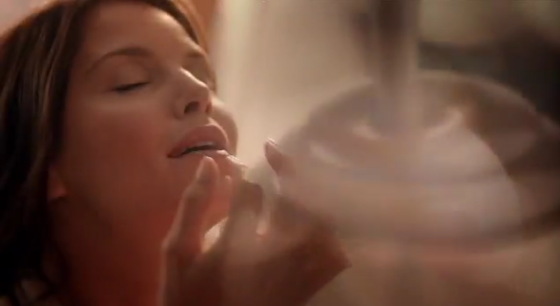 This chocolate is "created with passion by Lindt's master(bating?) chocolatiers" -- one of whom stares disturbingly at a chocolate-covered whisk like he's planning to use it in a passionate way. Narrator: "When you break its shell, Lindor's smooth center begins to melt ... and so will you." Tagline: "Do you dream in chocolate?" (Unofficial tagline: "Do you wet dream in chocolate?")
This chocolate is "created with passion by Lindt's master(bating?) chocolatiers" -- one of whom stares disturbingly at a chocolate-covered whisk like he's planning to use it in a passionate way. Narrator: "When you break its shell, Lindor's smooth center begins to melt ... and so will you." Tagline: "Do you dream in chocolate?" (Unofficial tagline: "Do you wet dream in chocolate?")
5. Dove Ice Cream
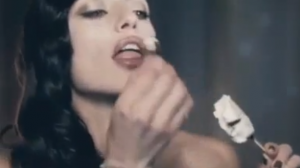 Ah, another adgasm from Dove. The woman stares into the camera as she seductively opens her mouth and pleasures the ice cream bar, and then bites into it (ouch!) She finger-feeds herself and puts the stick between her teeth like a Flamenco dancer's red rose. Tagline: same as the Dove chocolate ad above -- "Your moment. Your Dove" -- but this ad says to share your "moment" on Facebook. I'd recommend against sharing, especially if you ever plan to run for public office.
Ah, another adgasm from Dove. The woman stares into the camera as she seductively opens her mouth and pleasures the ice cream bar, and then bites into it (ouch!) She finger-feeds herself and puts the stick between her teeth like a Flamenco dancer's red rose. Tagline: same as the Dove chocolate ad above -- "Your moment. Your Dove" -- but this ad says to share your "moment" on Facebook. I'd recommend against sharing, especially if you ever plan to run for public office.
6. Magnum Ice Cream
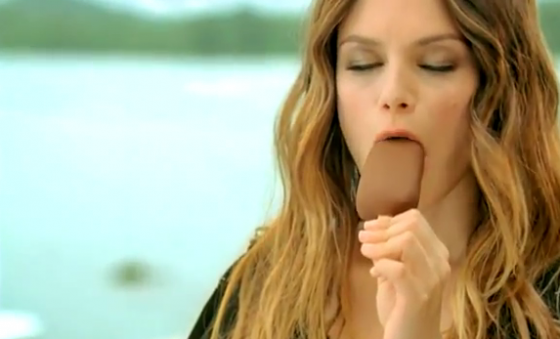 While stuck in traffic, Rachel Bilson jumps barefoot from car to car, so she can blow an ice cream bar. (Side note: Magnum is also a brand of condoms, so if you use them together, the ice cream has zero calories!) Narrator: "Nothing will keep you from Magnum." Not even criminal charges from damaging a police vehicle and several other cars, abandoning your own car in the middle of the road, or inciting a riot. Tagline: "Magnum: For pleasure seekers." I hope it was worth it.
While stuck in traffic, Rachel Bilson jumps barefoot from car to car, so she can blow an ice cream bar. (Side note: Magnum is also a brand of condoms, so if you use them together, the ice cream has zero calories!) Narrator: "Nothing will keep you from Magnum." Not even criminal charges from damaging a police vehicle and several other cars, abandoning your own car in the middle of the road, or inciting a riot. Tagline: "Magnum: For pleasure seekers." I hope it was worth it.
7. Lay's Potato Chips
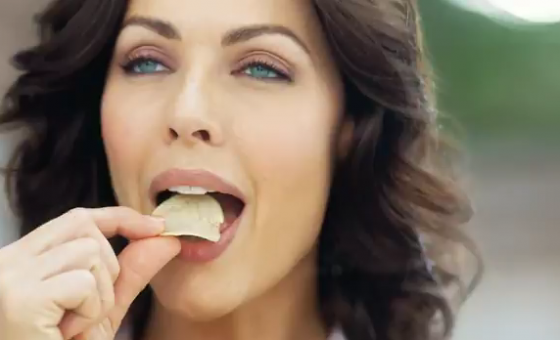 Woman flirtatiously opens up the bag and bites her lip as either the chips or Al Green serenades her with: "I'm so in love with you, whatever you want to do is alright with me." That's good, because she's in the mood to get ... lay-ed. Narrator: "One taste and you're in love." She should try Ruffles next time -- they're ribbed for her pleasure.
Woman flirtatiously opens up the bag and bites her lip as either the chips or Al Green serenades her with: "I'm so in love with you, whatever you want to do is alright with me." That's good, because she's in the mood to get ... lay-ed. Narrator: "One taste and you're in love." She should try Ruffles next time -- they're ribbed for her pleasure.
8. Carl's Jr. Western Bacon Six-Dollar Burger
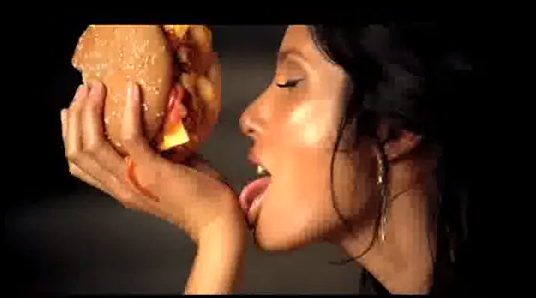 Padma Lakshmi strolls through an outdoor market. "I've always had a love affair with food," she says. After sitting down on a front stoop, she begins a girl-on-burger makeout session. The burger drips special sauce on her, and she licks it off. Narrator: "Carl's Jr. Western Bacon Six-Dollar Burger: More than just a piece of meat." How very clever. Hardee-har-har.
Padma Lakshmi strolls through an outdoor market. "I've always had a love affair with food," she says. After sitting down on a front stoop, she begins a girl-on-burger makeout session. The burger drips special sauce on her, and she licks it off. Narrator: "Carl's Jr. Western Bacon Six-Dollar Burger: More than just a piece of meat." How very clever. Hardee-har-har.
9. Disaronno Amaretto
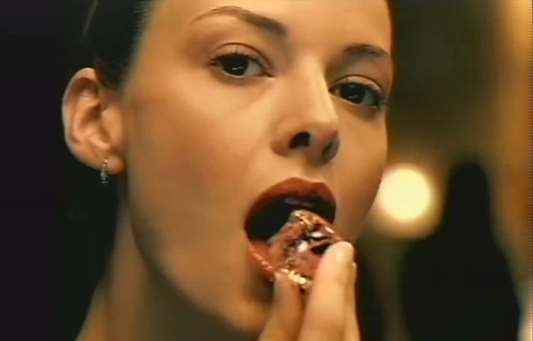 One drink makes the list. In this ad, the bartender tries to take the woman's glass away after she finishes, but she stops him so she can seductively suck the last drops of amaretto off an ice cube. Narrator: "Disaronno's warm and sensual (sexual?) taste makes you wish it would never end."After enough drinks, you'll wish it ended sooner. Tagline: "Disaronno -- pass the pleasure around" ... along with the STDs.
One drink makes the list. In this ad, the bartender tries to take the woman's glass away after she finishes, but she stops him so she can seductively suck the last drops of amaretto off an ice cube. Narrator: "Disaronno's warm and sensual (sexual?) taste makes you wish it would never end."After enough drinks, you'll wish it ended sooner. Tagline: "Disaronno -- pass the pleasure around" ... along with the STDs.
10. Baby Carrots
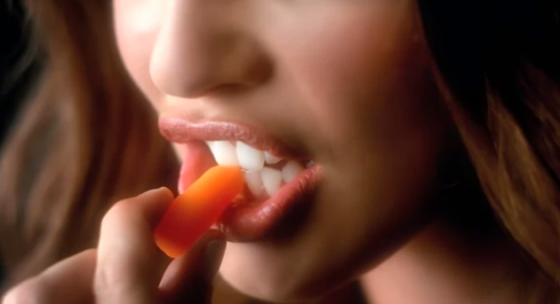 Yes, it's an ad for carrots. In this tongue-in-cheek (tongue-on-carrot?) ad, the woman gets freaky with Bugs Bunny's favorite treat. (What's up with that, Doc?) As the woman strokes a carrot up her own arm, the female narrator says: "Feel that feeling -- you know the feeling," to which the male narrator answers: "It's overt sexual innuendo." I just hope they don't move up to adult carrots ... or fingerling potatoes. That would just be dirty.
Yes, it's an ad for carrots. In this tongue-in-cheek (tongue-on-carrot?) ad, the woman gets freaky with Bugs Bunny's favorite treat. (What's up with that, Doc?) As the woman strokes a carrot up her own arm, the female narrator says: "Feel that feeling -- you know the feeling," to which the male narrator answers: "It's overt sexual innuendo." I just hope they don't move up to adult carrots ... or fingerling potatoes. That would just be dirty.
BONUS: Axe Dark Temptation Body Spray
 Although this is technically not a food, it still makes the list. Guy sprays on Axe, which turns him into Irresistible Chocolate Man. As he walks down the street, he breaks off pieces of himself and feeds them to women. Then women start grabbing licks and bites for themselves. These two women go for the ears first, just like a chocolate Easter bunny. Tagline: "As irresistible as chocolate. New Axe Dark Temptation." Wonder if he's solid or if he has some kind of filling?
Although this is technically not a food, it still makes the list. Guy sprays on Axe, which turns him into Irresistible Chocolate Man. As he walks down the street, he breaks off pieces of himself and feeds them to women. Then women start grabbing licks and bites for themselves. These two women go for the ears first, just like a chocolate Easter bunny. Tagline: "As irresistible as chocolate. New Axe Dark Temptation." Wonder if he's solid or if he has some kind of filling?
Courage to be Real Campaign
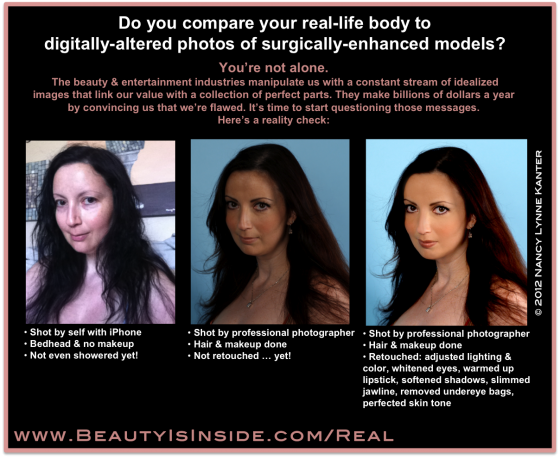
This is me. Don't think for one second that posting a picture of myself with dirty hair, no makeup, and in unflattering lighting didn't take some ovaries! Like many women, I've struggled with not feeling pretty enough, thin enough, perfect enough. I'll be the first to admit that I think I look the best in the photo on the right. It's the photo I use on the back of my book and on the About Me page of this website. I am definitely a product of our beauty-obsessed culture. But this is also me sacrificing my vanity for the greater good. How can I talk about body acceptance and the need to fight against sexist and oppressive imagery if I'm not being real with myself? It takes courage to be real. So everyone, this is what I look like in the morning. Deal with it.
The media manufacture female insecurity for profit. They invent flaws in our appearance and pressure us to fix them. They segment the female body as if it were a bucket of chicken -- we're just legs and breasts and thighs. They convince us that our bodies are too meaty and fatty, our skin is too greasy, and our hair is too fried. They manipulate us with idealized images of hot chicks who were perfected by plastic surgeons, injectable facial fillers and paralyzers, professional photographers, makeup artists, special lighting, hair stylists, fashion designers, and finally photoshopping. And then we compare our real selves with this illusion. It's not a fair fight.
A woman's appearance is always treated as relevant. Tabloids critique female celebrities for gaining weight or having the "worst beach body". The Playmate of the Year is featured on the evening news. Political commentators assess female candidates' appearance almost as much as their political beliefs. We're trained to think that our sexuality is our primary source of power. I discuss this in my upcoming book, If Beauty Is Inside, Why Do We Hate Our Guts?: Pop Culture, Sexism, & Power. In the recent documentary Miss Representation, the filmmaker also examines how our culture's sexualization of women actually minimizes our power in society. Just think about it -- if the most powerful women in the country are reduced to their looks, how can any of us expect to be treated with respect?
It starts with respecting ourselves and having the courage to be real. We have to stop allowing the media to define us in such a superficial and demeaning way. When we pull back the curtain, we see that the sculpted and perfected illusion is just a real woman who has more in common with us than we think.
I wasn't exactly excited to share my naked face with the Internet, but I put together the above image so that you could see the reality behind the special effects. I'd love to see models and celebrities do the same, but their careers depend on them maintaining the illusion. So for now, maybe it'll just be up to us regular women. And that brings us to Beauty Is Inside's new "Courage to be Real" Campaign!
The "Courage to be Real" Campaign is about cracking the illusion of perfection that makes us hate our bodies and compete with each other. I challenge you to be courageous and send in "before and after" photos of yourselves, along with what was manipulated in the "after" photo. Send your photos to real@beautyisinside.com. I'll collect them all in a photo gallery on this site, and I'll also post them on the Beauty Is Inside Facebook page and on Twitter @_BeautyIsInside.
Come on -- if I did it, so can you! Together, we can inspire other women and girls to have the courage to be real themselves.
Purple Paper Project
I'm pleased to announce my new "ad campaign" -- introducing the "Purple Paper Project"! For this project, I'll be critiquing offensive advertising messages with the help of little purple papers and a little snark. Each new ad will be posted here on my blog, and I'll compile them together in the "Purple Paper Project" tab in the right sidebar.
We see about 3000 advertising messages everyday. Even when we're not paying attention, they're always in the background. Cumulatively, these messages affect how we feel about ourselves. In so many ways, they tell us we're too fat, our skin looks like crap, and our house is a mess. They teach us what society expects of us -- and how we're not measuring up. They play on our insecurities, and even invent new ones for us to obsess over (cankles, anyone?). But don't worry, because they're sure to have a product or service that can fix our "flaws"! How very convenient!
The more I started paying attention to these messages, the more I realized how manipulative, insulting, and sexist they were. And I also realized that I was buying right into them. Maybe I did need to lose weight, improve my skin, and clean my house more thoroughly.
Or maybe my weight, skin, and house were just fine the way they were.
Advertising is a one-way form of communication in which powerful corporations try to persuade us to spend our money by manipulating our insecurity. The "Purple Paper Project" is about turning this into a two-way conversation. Consumers have powerful voices too, and it's about time that we started talking back.
To kick this project off, here's an ad from Viva paper towels:
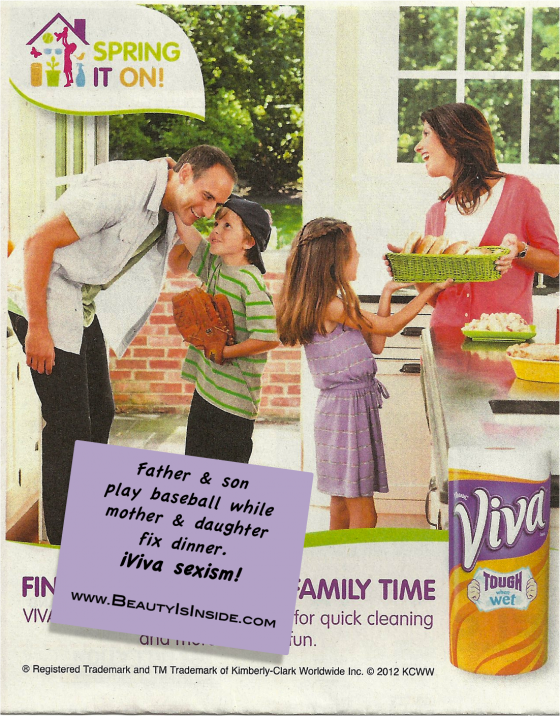
SLUT: See Limbaugh, Unevolved Troglodyte
Rush Limbaugh has been all over the news since his misogynistic rant about Sandra Fluke, the Georgetown University law student who testified before Democratic members of Congress about birth control coverage being a necessary part of women's health. His rant went on for over three days, during which he called her a "slut" and a "prostitute," along with about 50 other insults. Apparently, each of those insults has now cost him an advertiser, as 50 of them (so far) have pulled their ads from his show. Granted, one must wonder why they ever decided to advertise with him in the first place. As a man who regularly spews sexist manure and the one who coined the term "feminazi," it's obviously not his first sexist rodeo. However, this time enough people grabbed the bully by the horns and put pressure on his advertisers to try to make it his last.
After several advertisers initially dropped him, he made a half-assed apology to Fluke, during which he just reiterated what he'd previously said. At that point, you'd think he might slither away from sexist rhetoric until the heat went down ... but nope. Just last week, he made demeaning comments about author Tracie McMillan, including calling her an "authorette" and stating: "What is it with all these overeducated white women?"
Actually, what is it with all these sexist and ignorant old white men? Clearly he's threatened by "overeducated white women" and "feminazis" -- and rightly so. We tend to think women should be treated with respect and fairness. And when we're called things like "slut," "prostitute," "overeducated," and "feminazi" by a cave-dwelling radio personality, we're likely to call him on his shit.

The most disturbing thing about Limbaugh's vile comments are that he isn't alone. Attitudes such as his underlie legislative and religious efforts to politicize our reproductive health and police our sexuality, and they also underlie violence against women in general. It's all about control. The attacks on reproductive rights aren't even about birth control -- they're about woman control. And words like slut are used to shame us, silence us, and put us back in our places.
One thing that cave-dwelling troglodytes are good at is lighting fires. And Limbaugh certainly lit a big one this time.
Referring to a woman as a "slut" and a "prostitute" for sharing her beliefs about birth control, saying that ”she wants you and me and the taxpayers to pay her to have sex” and that she should post a sex video as repayment -- these statements aren't merely the sexist tirades of a bloated blowhard -- these are inflammatory comments on a grander  scale. They contribute to a culture in which demeaning women is normalized. He's fueling the fires of those who share his misogynistic views, fueling their anger toward women for being immoral sluts because they dare to have sex without shame. He's fueling the justifications of those who see women as sexual objects who owe them sex. He's fueling the anger at women who dare to turn down sexual advances. He's fueling the claims that women ask to be harassed or raped because of how they act or dress. These words fuel the fires of those who share the opinion that women should have no voice, that we should be silenced so that we can't challenge their dominance. These are the beliefs underlying the verbal attacks by trolls on online comment boards when a woman dares to speak her mind. And these attitudes are the beliefs underlying more severe misogyny.
scale. They contribute to a culture in which demeaning women is normalized. He's fueling the fires of those who share his misogynistic views, fueling their anger toward women for being immoral sluts because they dare to have sex without shame. He's fueling the justifications of those who see women as sexual objects who owe them sex. He's fueling the anger at women who dare to turn down sexual advances. He's fueling the claims that women ask to be harassed or raped because of how they act or dress. These words fuel the fires of those who share the opinion that women should have no voice, that we should be silenced so that we can't challenge their dominance. These are the beliefs underlying the verbal attacks by trolls on online comment boards when a woman dares to speak her mind. And these attitudes are the beliefs underlying more severe misogyny.
These words aren't uttered in a vacuum. Especially when they're uttered by a media personality with millions of like-minded viewers. Violent actions are precipitated by violent beliefs. In the same way that a disease epidemic affects the weakest members of society first, so does inflammatory rhetoric. Limbaugh reinforces the beliefs of those listeners who share his sexist views; those who have anger issues, antisocial personalities, or other psychological disorders may indeed act out that misogyny. His words fuel their beliefs and their justifications for treating women as objectified less-than-human beings. Thousands of women in this country are physically and sexually assaulted not only by strangers, but also by men they know, including their own partners. Men who see women as equals and deserving of respect do not generally beat and rape women. They also don't call us sluts or prostitutes or try to control our bodies.
A disturbed person may be the one who ultimately lights the match, but vile-hate-spewing-"entertainers" like Limbaugh are the ones providing the gasoline. And both need to be extinguished.
Super Sexism – Not Buying It
Unlike most commercials, those that air during the Super Bowl are ones that people actually want to watch. These $3.5-million-per-30-second-time-slots can be opportunities for companies to be clever, maybe even inspiring ... but instead, many insist on falling back on lazy and uninspired sexist clichés. This is so expected in fact, that MissRepresentation.org, a campaign named after the brilliant documentary film, asked viewers to call out these companies on Twitter with the hashtag #notbuyingit.
Here are the 5 worst offenders, followed by a sampling of You Tube comments that show how sexist messages reinforce viewers' own sexist beliefs:
1) Teleflora -- In what seems more like a Victoria's Secret ad than an ad for a florist, a Victoria's Secret model explains to guys that purchasing a few stargazer lilies is enough to make a girl feel obligated to have sex:
And here are a few comments from enlightened viewers (typos left intact):


- • "It would be so cool to watch a bunch of fat ugly women, chowing down on chips, burgers and fries while they watched this commercial. Those hogs would be spewed out chewed food swearing at the tv. And fat ugly chicks care to comment on this? And how did you react?"
2) Fiat -- In this rarely-used cliché, an attractive woman inexplicably seduces an unattractive geek. She apparently finds being eye-groped a turn-on. I know that I totally wanted to do the last creeper who eye-groped me on the street. I mean what girl wouldn't?
And a few comments:
- • "Insecure and/or ugly chicks tend call things 'sexist'. Lighten up."
- • "if i buy that car i'll ride it hard:)"
- • "This commercial gets 4 boners out of 5. There is nothing more sensual and intriguing than foreign women. American women are so one dimensional, this one is amazing. European and Latin women are the best in the world. American women are total crap!" (48 thumbs up)
3) NFL -- Here's the super-original fantasy of having a bunch of nearly-nude fembots mindlessly standing at attention in the background in case they're needed to fulfill the sexual fantasies of average-Joe-millionaires.
And a couple of comments:
- • "great ad David! big pimpin!!"
- • "Expansive girls can be had pretty cheap actually."
4) Go Daddy (shocking, I know!) -- Judging by their consistently pervy Super Bowl commercials, you'd think Joe Francis was somehow behind it all. Not sure what half-naked girls gone wild have to do with web-hosting, unless Go Daddy is the go-to web host for porn sites.
Here's a comment that's actually critical of the ad:
And these two commenters quickly put her in her place:
- • "sexist douche bags run this company and the ads are almost always sexist. Jillian Michaels has lost any self respect as a woman by working with these tools"
- • "Oh Stfu.. Your just mad cause you look like shit so you start calling people "sexist" because of their commericals just stfu and sit down.. They have a Job I don't see them complaining about it.."
- • "You in the Kitchen?"
5) M&Ms -- And last, but not least sexist, and also oddly ironic ... we're introduced to Ms. Brown, an intelligent and articulate female M&M who voices her annoyance at being treated as eye candy, but whose objection gets shut down by an idiot:
Sigh. We feel your frustration, Ms. Brown M&M. We really do.
We All Need Allies
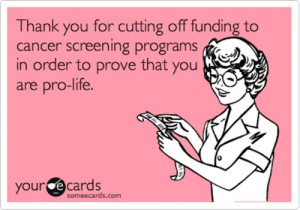 Susan G. Komen for the Cure has just reversed its decision to cut funding to Planned Parenthood "after a category 5 shitstorm threatened to completely taint the brand," as Jezebel so eloquently put it. But the Komen brand has already been tainted by their hypocrisy -- if they're supposedly dedicated to women's health, why would they make decisions that support a political ideology that threatens women's health?
Susan G. Komen for the Cure has just reversed its decision to cut funding to Planned Parenthood "after a category 5 shitstorm threatened to completely taint the brand," as Jezebel so eloquently put it. But the Komen brand has already been tainted by their hypocrisy -- if they're supposedly dedicated to women's health, why would they make decisions that support a political ideology that threatens women's health?
Yesterday, a friend defended Komen's right to withdraw their funding, arguing that they've still done a lot of good with the millions they've dedicated to fighting breast cancer. It wasn't my friend's support of Komen in itself that bothered me. It was that my friend is gay, and he didn't seem to recognize the harm in supporting a group that bends over to pressure from the conservative right.
Komen's good deeds don't erase their bad ones, just as the Salvation Army's charitable work doesn't erase their anti-choice and anti-gay "position statements." Komen's actions are part of an onslaught of right-wing conservative attacks on Planned Parenthood and abortion access in the past year. These are the same people who'd also fight to prevent my friend from getting married. In fact Karen Handel, Komen's senior vice president for public policy and the one who's been credited with making the decision to cut ties with Planned Parenthood, is also a bit of a homophobe. As the Metro Weekly reported:
During her 2010 Republican bid for Georgia governor, Handel supported defunding Planned Parenthood as well as outlawing gay adoption and criminalizing same-sex marriage statewide. In an interview with 11alive, an NBC affiliate, she was interviewed about her view on same-sex relationships:
Q: You have said that you are -- you're against gay marriage, right?
A: Mm hm. Absolutely. Marriage is between one man and one woman. And I've been very very clear about that. And the record is clear about any of the other issues like domestic partner benefits or anything like that. In fact in Fulton, I voted no on domestic partner benefits.
Q: Are you against civil unions for gays?
A: Yes. I think that's not an issue that has come forward in Georgia. We have the constitutional amendment against gay marriage, and I don't want to see any taxpayer funding going toward benefits etcetera for a couple that is not married. In our state and for me, marriage is for one man and one woman.
This isn't a coincidence. There's an interrelationship between all forms of oppression -- those who'd oppose the rights of one minority will often oppose the rights of another. In this way, they truly don't discriminate.
Throughout history, it's taken more than just members of a minority group to fight for their own rights. It took more than suffragettes to fight for women's right to vote. It took more than African-Americans to fight for Civil Rights. Today it takes more than homosexuals to fight for the right to marry whom they love. And it takes more than feminists to fight for women's rights to make our own reproductive decisions.
We all need allies.
One hundred years ago, there were plenty of men who weren't too keen on allowing women to vote -- let alone run for office -- a right that Handel now takes for granted. But there were enough male allies to turn the tide. It's infuriating when those in positions of privilege fight so hard to deny minorities these basic rights. It's depressing when others turn the other way and let it happen. But it's a damn shame when fellow minorities throw each other under the bus by failing to recognize that we're fighting similar battles. We all know what it feels like to have our rights determined by the majority. We're in the same damn boat. None of us should be willing to let another one sink.
"First they came for the Jews and I did not speak out because I was not a Jew. Then they came for the Communists and I did not speak out because I was not a Communist. Then they came for the trade unionists and I did not speak out because I was not a trade unionist. Then they came for me and there was no one left to speak out for me." -- Martin Niemöller (1892–1984), German Pastor, regarding political apathy
Harm against one is harm against another. We all must remember this ... for the cure to oppression -- no matter the type -- is to fight it together.
Who’s Hotter?
I recently posted an article about the image below, which is currently circulating around the Internet. As I mentioned in the previous post, this faux-empowerment message just ends up pitting thin girls against curvy girls, feeding the comparisons and competitions, and separating us all. As a result, we fight against each other instead of fighting against the beauty pressures that make us feel insecure in the first place. Here's the original image:
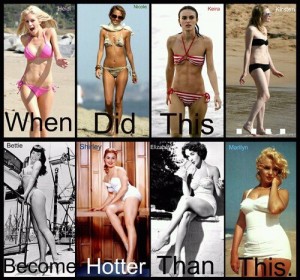
What's the next logical step?
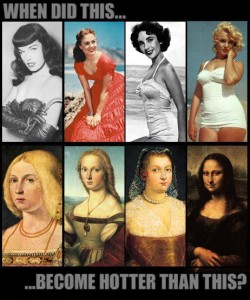
and then what about this?
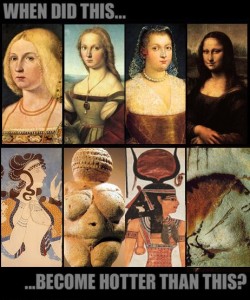
Haven't we all had enough? Isn't it about time that we move past the pettiness and start working together?
Cool Story, Babe
Ugh. Can't a girl enjoy a nice afternoon at the mall? It's bad enough that most stores' mirrors and lighting age us by 10 years and increase our weight by 10 pounds. It's bad enough that stores display boxes of damn hangers that talk about how skinny they are and imply how skinny we aren't. It's bad enough that we have to pass by 10-foot tall posters of nearly naked models in Victoria's Secret's windows. And it's even worse when the local Victoria's Secret is right next door to a See's candy shop. But come on. Seriously? A trip to the mall now has to include cheap insults about women being so intellectually boring that we should just get back in the kitchen? Guess we haven't come such a long way, baby ... when this kind of crap is still being sold.
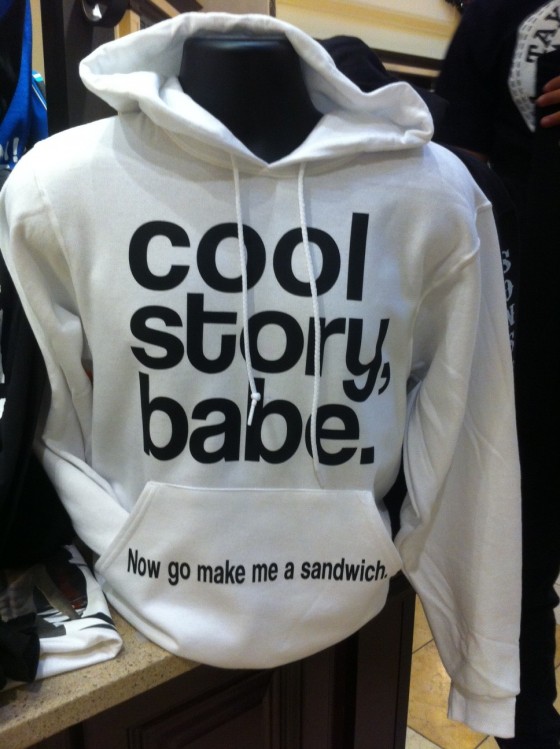
Now I'm not sure what type of person would purchase this sweatshirt. Maybe the type of fine gentleman who'd also purchase Playboy cologne? Or maybe it would be the type of sell-out wife who'd wear this shirt?
Regardless, here's a "cool story": The next guy wearing this juvenile-not-even-close-to-witty-excuse-for-a-fashion-statement may indeed get some "babe" to make him a sandwich ... it just might be of the knuckle variety.
Real Women Have … Bodies
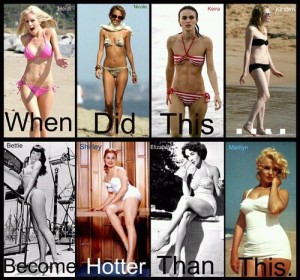
The other day, my friend shared this image on my Facebook wall. I'm sure she had good intentions, as did the creator. At first glance, it seems like a girl-power-feel-good-kind-of-message that challenges the pressure to be thin, similar to the "real women have curves" mantra made popular by the movie of the same name. It seems to be about women celebrating their curves, accepting their bodies, and not buying into the extreme dieting mentality.
But it's not. This image is about shaming thin women about their bodies under the guise of empowering heavier women. It's just the other side of the same coin.
What about women who are naturally thin? Or naturally not as curvy? Are they less hot? Are they not real women? Comparing is just one more way for us to separate ourselves.
Most of us struggle with our weight, so being in the public eye would most assuredly have an impact on how celebrities feel about their own bodies. Heidi Montag had 10 plastic surgeries so that she could look hot enough. Tabloid rumors have accused Nichole Ritchie and Keira Knightley of having eating disorders, and Kirsten Dunst was on the cover of Star Magazine for having one of the "worst beach bodies," so it's not as if any of them are being celebrated for their bodies at the moment. The media's pretty arbitrary anyway about what constitutes the hot-kind-of-thin vs. the anorexic-kind-of-thin. It's a fine line, and those celebrities who cross it are publicly shamed on tabloid covers. I'm sure Bettie, Shirley, Elizabeth, and Marilyn faced their share of scrutiny and pressure as well based upon the beauty standards of their time. Elizabeth Taylor, for one, suffered from both eating disorders and substance abuse. Considered by many to be the most beautiful woman in the world, she was once quoted as saying, "I don't like my voice. I don't like the way I look. I don't like the way I move. I don't like the way I act. I mean, period. So, you know, I don't like myself."
Beauty is subjective. Others' opinions about us are irrelevant -- what matters most is how we see ourselves.
The body snarking, the gossipy headlines about who has anorexia or who's getting fat, the who's hotter comparisons -- these all promote the age-old competition to determine the fairest of them all. And eating disorders are part of this futile attempt to fit what society deems "hot".
There's value in simply being who we are, whether we're thin or fat or have curves or not. So, in response to the question: "When did this become hotter than this?", here's another question: Why do we have to cut someone else down to feel better about ourselves?
This Is Your Life
This past Christmas morning, 8-year-old Elijah anxiously waited for his mom to return from work so they could open presents together. Donna Fountain left for her job in Brooklyn at 7:30am. She was a single mother and her hard work as a home health care worker allowed her to provide for her son -- even if it meant she had to work on Christmas Day. But soon after leaving the house, Donna was struck and killed by a hit-and-run driver while crossing the street. Police found a folded and wrinkled slip of notebook paper on the 38-year-old woman's body. Donna carried it with her everywhere. On that piece of paper, Donna had written out five life goals that she had hoped to accomplish. She titled this list "My Dreams":
- Work on my dream job.
- Buy a house by 45.
- Start housing for gay and lesbian teens.
- Marry the woman of my dreams.
- Make sure Elijah graduates from college!
A careless and heartless driver stole Donna's chance to see these dreams materialize. They remain immortalized in pencil on a crumpled slip of paper. Many of us have similar lists of our own, either written down or simply living in our heads. We postpone them, assuming we have plenty of time left. But this isn't always true.
As New Year's Day approaches and we start compiling our lists of resolutions (which are generally just variations on last year's), maybe we should think twice about our dreams for the year. Instead of the typical "lose weight," why not strive for more meaningful pursuits? Why not let Donna's dreams inspire us to live our own? Why not resolve to be the best version of ourselves? To really LIVE? And then to drag the words off the paper and turn them into action?
Note that nowhere on Donna's list of dreams was "Lose 20 pounds."
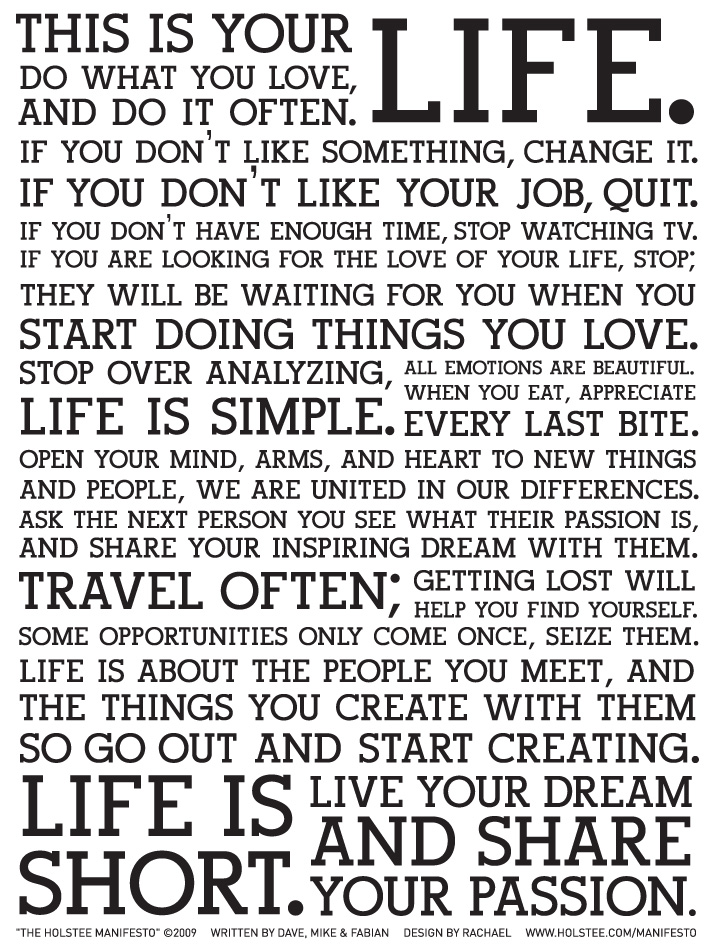
Feminist Action Figures!
Here's an awesome fake commercial advertising the Brontë Sisters Power Dolls. Named after the classic-novel-writing-sisters Charlotte, Emily, and Anne Brontë, the dolls were featured as part of a 1998 series that re-imagined historical figures as action figures. In this commercial, kids make the Brontë Sisters fight against the evil publisher so they can get their books into print. The Brontë Sisters come with Super Disguise Mustaches! and Boomerang Book-Throwing Action!, and can transform into a Brontësaurus with barrier-breaking feminist vision! Check it out:
Unfortunately, these dolls aren't real. For now, girls will just have to choose from Bimbo Barbies who stand around looking pretty, Bratz Dolls who look like mini porn stars with eyes larger than their waists, and Disney princesses who always seem to be waiting for their princes to save them.
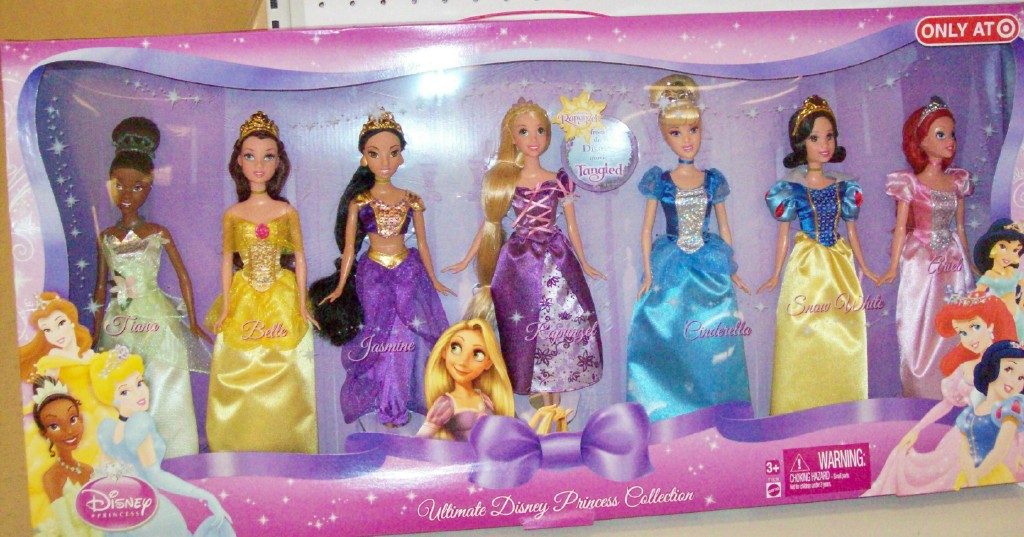
I'd like to think as a girl, I would've chosen the Brontë Sisters Power Dolls (if they existed) over the others. But honestly, I'm not so sure. (I totally wanted to be Cinderella.) As a culture, we need the barrier-breaking feminist vision to offer girls more options so that they can emulate cool action figures like the Brontë Sisters. Otherwise, they'll just keep getting more inaction figures that reinforce the value of standing around looking pretty.
Whorin’ Ain’t Easy
In pop culture, a whore is demonized -- she's a woman who sells her body for money, a prostitute. She's promiscuous and immoral. She's unclean -- she's a dirty whore, a filthy whore. She's damaged goods and the opposite of virgin. It's a bad thing to "whore yourself out" or to be anyone's bitch. A Google image search for "whore" will bring up lots of porn (so make sure your SafeSearch is on) and quite a few demotivational posters about "attention whores". The whore doesn't have much power -- she's the thing, the object, the product being used.
In contrast, pimpin' is a compliment. A pimp is cool -- he's got money, nice clothes, a fancy car, and all the whores. If you search Google images for "pimp," you'll find pictures of rappers holding wads of cash; flamboyantly-dressed guys doing "pimp walks" in fur coats, big hats, and gold chains; pimps surrounded by scantily-clad hos; and ads for MTV's "Pimp My Ride". Even the pimps' violent language against women is mainstream (e.g., "bitch-slap," "smack that ho," "you're my bitch," etc.). Pimps are celebrated -- they have money, power, and control. They represent another concept that our culture celebrates: capitalism.
The concept of john is neither demonized, nor celebrated -- his role is largely ignored. Boys will be boys (and some boys will be johns) who are driven to seek out sex (in secret, hidden away from wives, girlfriends, or work buddies). A john is just a nameless, faceless customer. He's not particularly shamed like the whore, even though he's vital to the transaction. A john doesn't have a strong pop cultural presence. No one's ever going to "john their ride," nor are they ever accused of "johnin' themselves out". A Google image search for "john" brings up ... just a bunch of pictures of guys named John.
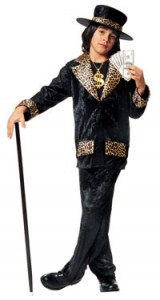
Celebrate the pimp,
ignore the john,
and demonize the whore –
this is what a sexist society looks like.
Here's a real-life "Pimp & Ho Party": Teenage girls running away to escape homes filled with physical, emotional, or sexual abuse. Forced to live on the streets in bad neighborhoods and sell their bodies, because there aren't many other options. Lingering on sidewalks waiting for potential customers prowling red-light districts in search of anonymous sex. Bending into lowered passenger-side car windows to negotiate bargain-basement-blowjobs with strangers. Risking sexually-transmitted diseases, sexual assault, and violence in exchange for cash. Sharing nightly earnings and bodies with pimps or risk even more violence. Using some of the cash to buy drugs and cheap alcohol to numb the pain.
Seriously, if you think pimpin' ain't easy, you should try whorin'.
Give a Hoot — Don’t Pollute!
I just found out that my own city in the suburbs is considering opening a Hooters. The new Hooters would replace another restaurant which also served a lot of meat -- Fuddruckers. The location is right across from Burlington Coat Factory and Buca di Beppo, bringing a whole new meaning to the term "strip mall."
By opening a location in my sleepy town, it appears as if Hooters has exhausted the tourist traps and they're hoping to expand to the suburban family demographic -- they do have a kid's menu after all. Apparently, Hooters is a family dining establishment when it can make them money, but it's also an adult establishment which offers "vicarious sexual entertainment" when it can get them out of equal employment lawsuits (e.g., requiring weight limits for female servers, not hiring male servers, etc.). Last year, a San Francisco attorney representing the National Organization for Women filed a complaint against Hooters claiming that they can't have it both ways -- that they can't defend themselves as adult establishments in lawsuits, while at the same time be catering to minors who are legally barred from such establishments.
Now, what kind of sick world are we living in if kids and sexual entertainment can't mix? What's next? Will they have to stop selling their "Hooters Gear" for kids? Where will responsible daddies buy their little sons "Hooters Girls Can't Keep Their Hands Off Me" t-shirts, "Your Crib or Mine?" bibs, or "I'm a Boob Man" rompers?
Anyway, back to my neighborhood -- let's just say that families who live in the suburbs aren't too thrilled with their potential new neighbor, as hundreds have let the city know. In addition to its breasts, legs, and thighs, Hooters is known for its wings. What if PETA came to town and used their typical tactics to protest Hooters, right alongside the local community? Would it be a protest or promotion? What a conundrum.
In response to the controversy, Hooter's CEO Rick Leukert was quoted in the local paper with a message to all the haters: "I would challenge them to go to Hooters and to look and see," he said. "The wonderful ladies who work for us are single moms, college students, family women, from all different backgrounds."
Oh, well that's a horse of a different color! People thought they were all just trashy sluts, but turns out they're actual real live women. Carry on then, for no one could have any other possible reason to object.
It's a clever little trick that the CEO chose to divert attention to the women's character, as if that were even the issue. No reasonable person questions whether Hooters girls deserve respect (please note: I said reasonable). Why not instead of debating their character, we debate the underlying sexist society that encourages its members to treat women's bodies as commodities? Or what if we debate the character of the pimps business people who profit from women's sexual objectification? Or what if we examine the psychological, sociological, and economic issues that lead women to see these types of jobs as viable/profitable options?
Surely, these will be the issues debated in the comments section of the local paper, right?
Yeah, right.
Once you wade through the stream of adolescent booby puns, you come across the truly sexist attitudes of the commenters -- and the lone woman who had the nerve to be a voice of reason, but instead became the object of their anger. The comments were primarily attacks on Hooters-hating women, and the attacks fell into three categories:
1) Get back in the kitchen and make me a sandwich.
2) You're just jealous because you're too fat/ugly to work there.
3) You're a humorless, butch, flannel-wearing, man-hating feminazi who wants to take away all the boobies. The nerve of some bitches!
How very enlightened and original! It's as if they've attended the Rush Limbaugh School for Women's Studies and Gender Relations. Such intellectual and well thought out arguments! And to think these fine men are members of my own community. The pride their mothers must feel.
While they differed in style, the Hooters CEO and the commenters were participating in the same process: by diverting attention to women's character (favorably or unfavorably), they were justifying their own sexism, their privileged male position in society, and their self-serving "right" to treat women as objects. 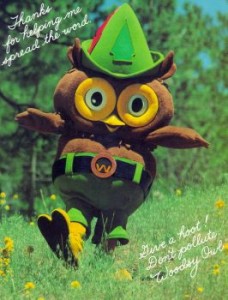
That's it -- I'm co-opting the owl idea from Hooters and asking Woodsy to consider moonlighting outside of his U.S. Forest Service gig as an anti-sexism bird of prey. It's about time that our society decides to give a hoot and not pollute ... with trashy places like Hooters. And we can use cutesy owls for it all.
Revenge of the Nerd
I often write about how women can reclaim our power against a culture that tells us that our bodies are our most valuable attributes. My passion about this issue was partly due to years of being bullied about my looks (among other things) as I grew up. I was one of the unpopular  kids from elementary through high school, and so being bullied was part of life. I had no idea why the other kids didn't like me, and I tried hard to figure it out. I would sit by myself outside of the library at lunchtime in my rainbow-striped top, my tan corduroy knickers that buttoned right below the knee, my burgundy knee socks, and my freshly-white-shoe-polished Payless tennis shoes, wondering why no one liked me. You'd better call Nancy Drew, because we have a mystery! My grandma told me the girls were just jealous because I was so much prettier than they were. I wish I were able to believe her, but grandmas have to say things like that.
kids from elementary through high school, and so being bullied was part of life. I had no idea why the other kids didn't like me, and I tried hard to figure it out. I would sit by myself outside of the library at lunchtime in my rainbow-striped top, my tan corduroy knickers that buttoned right below the knee, my burgundy knee socks, and my freshly-white-shoe-polished Payless tennis shoes, wondering why no one liked me. You'd better call Nancy Drew, because we have a mystery! My grandma told me the girls were just jealous because I was so much prettier than they were. I wish I were able to believe her, but grandmas have to say things like that.
I used to talk my mom into calling in sick for me all the time during junior high. I kept getting stomach aches right before the time we were supposed to leave for school. Concerned about my illness, my parents took me to a doctor who decided that I suffered from lactose-intolerance from the milk in my morning Cheerios. So my parents switched me to soy. No surprise – the stomach aches continued, because I wasn’t allergic to milk. I was allergic to the little shits who teased me. I was allergic to the dirty looks, the shunning, and the insults from the mean girls. I was allergic to being called ugly, smelly, and Casper because I was so pale. I was allergic to the shaming sting of cootie spray if I accidentally got too close to someone. I was allergic to being left out, to being picked last for teams, to being treated as if I were sub-human. I was allergic to no one standing up for me and to not having the tools to do it myself. Unfortunately, soy milk couldn't fix any of that.
Fast forward to my recent high school reunion. I wanted to see old friends, but I was dreading seeing the bullies who made my life hell. I was frustrated that they still had a hold on me, even as an adult. I had given them too much power for too long ... but now it was time to take it back.
As the night progressed, I finally got up the nerve to stand up for myself. I just knew I'd regret it if I didn't. So with the help of a few glasses of liquid courage, I confronted two of the mean girls and two of the mean guys. I didn't plan out exactly what I would say; I just ended up being real. I pulled each of them aside and nicely asked if I could speak to them for a moment. And one by one, I told them that they were pretty mean to me back in school, and I just wanted to know why. Was it something about me? I had spent years believing that it was me -- that I was bullied because I wasn't pretty enough, or thin enough, or simply just not enough.
And an amazing thing happened. Three out of the four bullies immediately apologized. The two guys acknowledged that they were jerks, and they both admitted that they took out their insecurities and family issues on other kids. That it had nothing to do with me. I wasn't prepared for them to be so introspective. One girl claimed that she didn't remember being bitchy to me, but she still apologized several times, hugged me, and seemed to feel guilty. The last girl just coldly stated that I was asking about something that happened many years ago, insisted that she didn't remember anything, and then reminded me again that it was many years ago.
But her response really didn't matter. None of their responses did. I confronted my bullies because I needed to stand up for myself, regardless of their reactions. And this time, I was detached enough to realize that their apologies or their denials had everything to do with them -- and nothing to do with me. When someone treats us poorly, often our first instinct is to wonder what it was about us that deserved the crappy treatment. Due to our own insecurities, we absorb their insults without considering that they actually reflect the insecurities of the other person. The worst part is when we take over the bullying ourselves.
Our early years can profoundly affect us long after we graduate. We spend less than 20 years in childhood, and another 20+ trying to undo the damage. If there’s a bright side for me, it's made me even more compassionate toward any group that's oppressed, because I know how much it hurts to be bullied and how much it sucks when no one defends you.
But the bullies aren't just in high school. The grown-up bullies have just graduated on to being mean in other ways -- to being critical and abusive partners and parents, to opposing the "homosexual lifestyle" and marriage equality, to treating other races as second-class citizens, to being intolerant and judgmental of others' religions or lack thereof, to supporting legislation that prevents women from having control over our own bodies, to treating women as dehumanized sexual objects. The media are a grown woman’s tormenters. They’re the mean girls and boys who tell us we’re ugly and fat, and that no one will like us unless we adhere to superficial beauty standards. I use my writing as a way of standing up to them.
We may have graduated from the playground, but we’re not immune to feeling bullied. The little kids inside us still want to be popular and accepted, and we don't want to be rejected. However, as grown-ups, we have more strength and resources than we had as children. We’re not the same powerless little kids. We no longer have to cry into our pillows at night. We’re old enough to fight against the bullies -- and to decide not to be bullies ourselves. We matter. We’ve always mattered, even if others were too blind or immature or insecure or heartless to recognize it. This was true when we were children, and it remains true as adults.
There will always be those who try to keep others down, but it's up to us to decide if we want to stand up to them or let them continue to victimize us. It's up to us to take our power back. And it's up to us to have the courage and compassion to stand up for others who have less power than we do.
And let me tell you -- it feels damn good to finally stand up.
Don’t Cha Trust Her
I found this stylish top in the Junior's section. Now why would a girl want to wear something like this? To display how competitive and untrustworthy she is? Or just to be mean and bitchy?
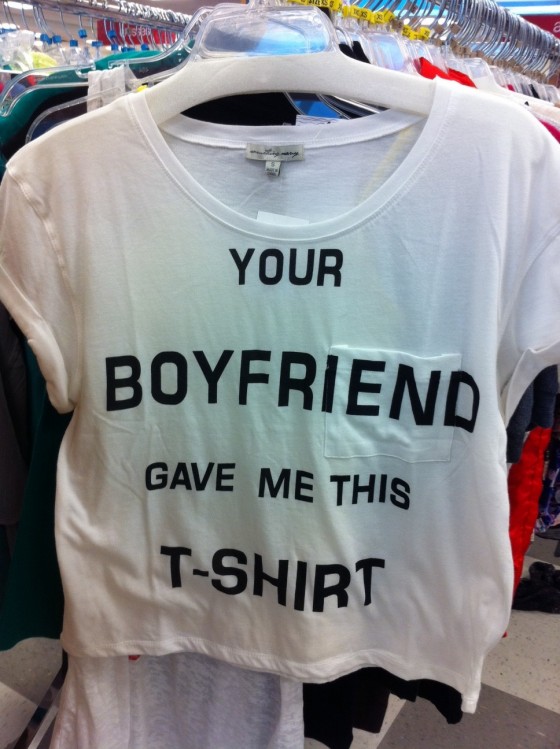
When I saw this t-shirt, I was immediately reminded of the song "Don't Cha" by the Pussycat Dolls. Granted, with their highly-sexualized image, the Pussycat Dolls are hardly models of progress, so lyrics such as theirs should come as no surprise. In case you haven't heard the song, here's the chorus: Don't cha wish your girlfriend was hot like me? Don't cha wish your girlfriend was a freak like me? Don't cha, don't cha, baby Don't cha wish your girlfriend was raw like me? Don't cha wish your girlfriend was fun like me? Don't cha, don't cha
Pop culture seems to treat petty competitiveness and insults as part of being female. The idiotic t-shirts, the man-stealing songs, the catty reality show contestants, the magazine articles about "What Makes Men Cheat?" -- they all regularly remind us that other women are threats. Until she proves she's our BFF, she's the enemy or worse -- the frenemy -- so we'd better watch our backs.
Some Bunny Stinks
The Playboy bunny logo has become a part of pop cultural imagery and can be found on hundreds of products, e.g., jewelry, handbags, t-shirts, and bedding. These products aren't just trashy and tacky, but they're subtle examples of how pornography has gone mainstream.
Below is a little something for the guys to remind them that wherever they're from, they can always smell like a dirty old man in a smoking jacket.
Introducing Eau de Douchebag, by Playboy.
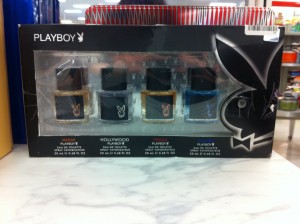 It's a little hard to read, but this collection includes the following four colognes:
It's a little hard to read, but this collection includes the following four colognes:
Miami Playboy -- Inspired by Palm Beach retirees in unbuttoned Tommy Bahama shirts exposing grey hairy chests and gold chains. Has a hint of coconut and Viagra.
Hollywood Playboy -- Inspired by short, balding, beady-eyed sleazebags who prowl Sunset Blvd. and try to get laid by name-dropping and claiming that they're producers. Has a shallow and superficial scent.
Vegas Playboy -- Inspired by married engineering conference attendees who high-five their buddies while getting lap dances and shouting "Vegas baby!" and "What happens in Vegas stays in Vegas!" Has a slight fragrance of stripper sweat and glitter.
Malibu Playboy -- Inspired by homeless 45-year-old surfers who reminisce about their high school glory days and call everyone dude and brah. Has an underlying whiff of rotting seaweed and ocean at low-tide.
Ugly Shade of White
I grew up in the suburbs of Southern California. Early on, I learned that there were subtle rules of what constituted an acceptable skin color in a primarily-white school. And these rules were separate from racial differences -- they were the rules about what white skin was supposed to look like. In my case, I was indeed white. The problem was that I was too white. I was Casper-white, glow-in-the-dark white, butt-white ... the ugly shade of white. To the other kids, my pale skin and dark hair contrasted in a bad way. Where I was from, you were supposed to contrast in a good way, meaning blonde hair and tan (but still white) skin. I got accused of being goth (that's like emo to those of you born a little later); I wasn't, but my corpse-like skin tone was what goth kids dreamed of. The popular kids regularly sneered that I should get a tan, and damn if I didn't try.
 I desperately wanted to be tan, because tan = pretty. Over the years I tried everything. I wore coffee-colored pantyhose under skirts and even shorts(!) on 90-degree days. I sunned myself on towels in my parents' weed-covered backyard. I over-baked in tanning beds until I got bulb-burn-stripes down my body. I broiled in the Acapulco sun like a crustacean on a BBQ until my bright red legs made standing so excruciating that I had to seek medical help. (As I was basting myself with the 0-SPF coconut oil I bought from a beach vendor, a passing woman stopped to tell me how beautiful my light skin was. How ironic.) No matter what method I tried, my skin only managed to turn from white to pink to red. And then ultimately to freckles. I just hope that I won’t develop skin cancer due to my efforts.
I desperately wanted to be tan, because tan = pretty. Over the years I tried everything. I wore coffee-colored pantyhose under skirts and even shorts(!) on 90-degree days. I sunned myself on towels in my parents' weed-covered backyard. I over-baked in tanning beds until I got bulb-burn-stripes down my body. I broiled in the Acapulco sun like a crustacean on a BBQ until my bright red legs made standing so excruciating that I had to seek medical help. (As I was basting myself with the 0-SPF coconut oil I bought from a beach vendor, a passing woman stopped to tell me how beautiful my light skin was. How ironic.) No matter what method I tried, my skin only managed to turn from white to pink to red. And then ultimately to freckles. I just hope that I won’t develop skin cancer due to my efforts.
I've since given up on achieving that sun-kissed look. The sun never even hugged me, no matter how hard I chased. Apparently, he was just not that into me. He always made promises like a big tease, and then ended up burning me over and over again. Trust me -- the sun's not that hot. Even if he fulfills his promise of a glowing tan, you'd better get yourself checked out. No one wants to bring home an outbreak of melanoma. Since I kicked the sun to the clouds, I use alternative methods of tanning. I now slather or spray stinky-smelling and streaky tanning shit. Or I just wear pants or a maxi-dress. (And that way, I don't even have to shave.)
It hurt to be judged for being too white, and I absorbed the criticisms as much as I did the damaging rays. No girl wants to feel ugly.
Women all across the skin color spectrum are affected by beauty standards. These standards come from both the dominant culture, as well as from each minority group within. In the Hispanic culture, skin that's "too dark" isn't generally considered attractive. Darker skin indicates more Indigenous blood than the preferable Spanish European blood. I've heard several people comment about the good-looking gueros (light-skinned males and females). I've heard women gossip about their friend's new baby: "Mira la morenita, la pobrecita" (Look at the little dark one, the poor thing). The telenovelas (soap operas) popular on Spanish television channels primarily feature light-skinned actors. Skin color doesn't just matter outside of their community -- it also matters within.
In the soon-to-be-released documentary, "Dark Girls," the filmmakers examine how attitudes about skin color affect women. They focused on dark-skinned African-American women, but as I watched the preview below, I could empathize with the self-disdain. One woman talks about how she felt about her skin as a little girl: "I can remember being in the bathtub asking my mom to put bleach in the water so that my skin would be lighter and so that I could escape the feelings I had about not being as beautiful, as acceptable, as lovable."
We can't control how others treat us, but we can control the way we treat ourselves. Why do we keep trying to find ways to separate and judge ourselves? I was teased about being too white, so I learned to view my white skin with disdain. It's sad enough that darker-skinned minorities are discriminated against by whites based on skin color, but even sadder that some would do the same to themselves. Please note that I am not saying that being "too white" is at all comparable to the racism experienced by people for being "too dark." The only aspect I'm comparing pertains to beauty standards. Clearly, there is a long and painful history of racism and discrimination in our country. What I can relate to is how it felt to be a little girl who thought she wasn't pretty enough because her peers judged her based on an arbitrary rule about the amount of melanin in her skin. If I could've added self-tanner to my bathwater as a kid, I would've done it.
It's heartbreaking to think that an innocent little girl would feel so ugly that she'd want to add bleach -- or self-tanner -- to her bathwater. But it's also a reminder of how we as women don't need others to hold us down. After awhile, we learn to do it to ourselves.
You Tell the Woman!
Here's an excerpt from an awesome little cartoon that shows what it's like to be a woman who dares to participate in the World Wide Web and the wide world beyond. Enjoy (or maybe just get pissed).
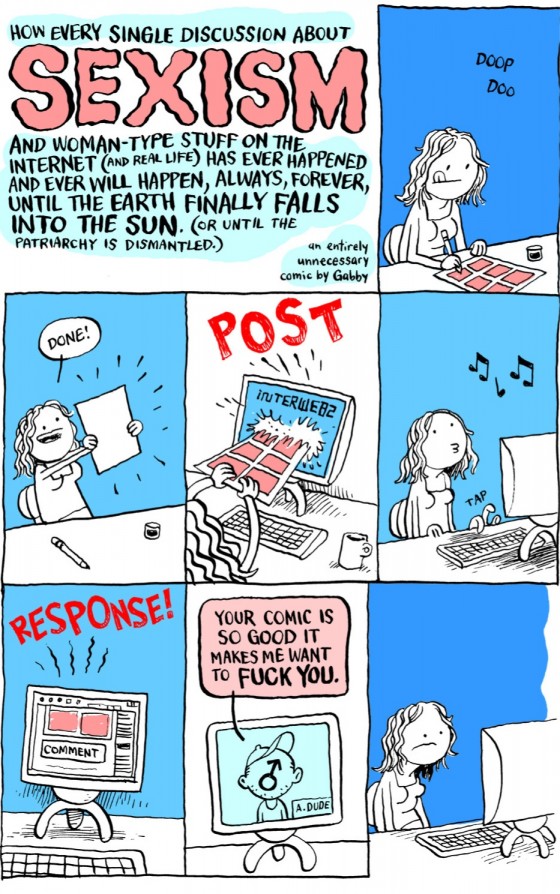
Check out the rest here.
'
Chasing the Deep
The media teach us
that our primary goals as women
should be weight loss and the pursuit of beauty,
and this is particularly true of celebrities.
--
Maybe it's time for us all to stop chasing pavements
in that direction
and instead,
start rolling in the deeper goals.
